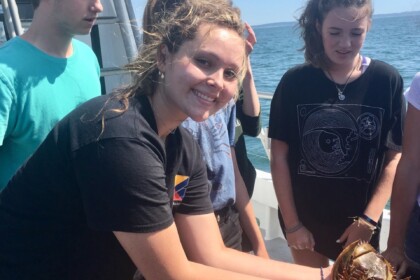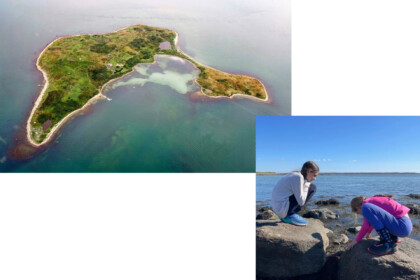
Set up a Trip now!

9 STEM Field Trips in the Cape Cod Region

By Shayla Flaherty and Rachel Dragos
Students who take part in field trips have better grades and higher graduation rates from high school and college. Additionally, 89% of adults in a recent study reported that educational trips had been a positive experience and had a lasting impact on their education, career, and lives.
During the COVID pandemic, students were not able to engage in hands-on, experiential, and connection-based learning that field trips provide. Field trip-based learning boosts student engagement, increases motivation, and promotes learning. Field trips also connect students to local STEM efforts and organizations, benefiting the local community. We hope this school year will see a resurgence in field trips.
The list below features unique STEM field trips in the Cape Cod region and community partners that are eager to open their doors to schools. Our region may be known for its beautiful ecology, but you can find great engineering, technology, and even astronomy STEM trips are here too. With the 2023 - 2024 school year approaching, consider planning a field trip for your classroom. And if you do, let us know about it!
1. Penikese Island School in Woods Hole

Penikese Island provides the perfect setting for fostering environmental literacy and stewardship. Penikese Island School, Inc, is a non-profit organization established in 1973 and based in Woods Hole, MA. Since 2019, Penikese Island School has operated as an immersive educational experience where Penikese Island is the classroom (Penikese Island School).
School trips bring local students in grades 4-12 to Penikese for a day of exploration, discovery, learning, and connection. These trips use curiosity to foster personal connection with nature while inspiring a lifelong respect for the environment, with students exploring their “own backyard” and strengthening their understanding of our coastal region.
Penikese Island school trips are generally offered for grades 4-8 but are open to high school and college level trips as well. Penikese Island is a 45-minute boat ride from Woods Hole. In addition to day trips, Penikese can also host overnight trips for 12-15 guests. A teacher from Sturgis Charter School in Hyannis described their experience at Penikese; they said, "Large enough to get lost on, but small enough to have a sense of the whole, Penikese is a point of sacred geography. Taking a group of fifteen high school kids to this island was one of the best and most impactful experiences I have had as an educator. It was great to see how the kids flourished in this unstructured environment away from technology and normal social roles. It also provided a truly unique opportunity for me to connect with students and colleagues.”
Ages: Elementary school through college
Science Curriculum Connections: Ecosystems, environmental exploration, marine science, bird observation, setting for an art inspiration or leadership development course, natural history, ect.
Contact: Kimberly Ulmer, Executive Director - kulmer@penikese.org
2. Massachusetts Alternative Septic System Test Center in Sandwich
The Massachusetts Alternative Septic System Test Center (MASSTC), a division of the Barnstable County Department of Health and the Environment, is the nation’s premier third-party testing and research facility for innovative/alternative (I/A) enhanced onsite septic treatment technologies. MASSTC is located on a two-acre parcel adjacent to the Joint Base Cape Cod military facility and comprises approximately two dozen test and research systems and associated wastewater infrastructure, offices, a laboratory, water reuse demonstration gardens, and other related projects.
Tour guests can expect to take a walk around the site while staff point out various test and research systems describing their design, function, performance, maintenance requirements, etc. and engage in discussion about related topics of interest. MASSTC hosts site tours with groups ranging from interested citizens, organized watershed protection groups, students, teachers, decision-makers, and regulators. Guests always leave feeling inspired, excited, interested, and informed about these very important topics of water pollution, wastewater treatment, and management.
Ages: Middle school and beyond
Science Curriculum Connections: Water pollution, nutrient management, chemical and biological treatment of wastewater to remove nutrients, ecological sanitation, nutrient recycling, etc.
Contact: Bryan Horsley, MASSTC Project Assistant - bryan.horsley@capecod.gov
3. Massachusetts Maritime Academy in Buzzards Bay
You might think of Massachusetts Maritime Academy (MMA) for college tours, but did you know that MMA has a bridge simulator, wind turbine engineering labs, and aquaculture labs to visit?
A tour at MMA is fully immersive and will take students around to see the engineering labs where they can observe and learn about turbines and engines as well as welding labs. Attendees will have the chance to see Mass Maritime’s many simulators such as the 360-bridge simulator and the EOTC where the Emergency Management Students train. Students can tour the aquaculture lab where cadets study marine life and the effects of climate change and pollution. Visits include a full tour of Mass Maritime’s facilities and possibly lunch in the mess hall pending the size of the group.
Specifically, addressed on the tour, the MMA full mission bridge simulator creates a mathematical model of a ship that behaves like its real-life counterpart. Cadets work together with classmates and experienced, licensed mariners to learn specialized skills and teamwork to prepare for situations they will encounter in commercial shipping and navigation. Some of these situations include undocking a tanker in Japan, transiting the Strait of Gibraltar in heavy traffic, handling a ship in heavy weather, and returning to MMA’s own home port in Buzzards Bay. The goal is to give cadets the skills they need to function as an effective bridge team member.
Ages: Middle school and high school
Science Curriculum Connections: Engineering, career pathways, manufacturing, sustainability, energy systems, marine navigation and shipping, aquaculture, environmental science, emergency management, ect.
Contact: Dana Ferris, Assistant Director Projects and Events- dferris@maritime.edu - 508-830-6600
4. Atlantic White Shark Conservancy in Chatham
The mission of Atlantic White Shark Conservancy is to improve public safety, support scientific research, and educate the community to inspire white shark conservation. White sharks are top predators within marine ecosystems that play a critical role in maintaining a healthy and balanced habitat (Atlantic White Shark Conservancy).
Atlantic White Shark Conservancy’s in-school programs are designed for all grade levels. Programs can be customized for an individual class, grade level, or full school. The hands-on programming can include mock shark tagging, lessons on shark anatomy, learning about fossils through shark teeth investigations, and white shark identification. The Conservancy also offers hands-on experiences for students at their Shark Center Chatham location. Students are invited to tour the museum and participate in an experiential lesson in the learning lab during their time at the facility.
"The connection between our home environment and the animals that we share it with is priceless," said one teacher visitor. "It's a goal of education to tie classroom learning to real-life experiences and this is extremely prevalent with the Great White Shark. And, who better to educate us than the people who know the most!"
Ages: All grade levels
Science Curriculum Connections: White Shark anatomy / biology, habitat and ecosystems knowledge, conservation, skill learning such as shark tagging, identification, fossil knowledge, ect.
Contact: Kristen Smith, Community Engagement Manager - kristen@atlanticwhiteshark.org
5. The Center for Coastal Studies in Provincetown
The Center for Coastal Studies (CCS) is a non-profit organization committed to understanding, preserving, and protecting marine ecosystems and coastal environments through related research, education, and public policy endeavors (Center for Coastal Studies).
The Center for Coastal Studies offers a wide range of potential field trip opportunities. The organization works with all age ranges from PK-college. The Center for Coastal Studies offers hands-on programs on plankton and marine animal disentanglement for students ages PK-8th. Some programs focus on marine plastic pollution, including beach cleanup service projects. These programs are geared to grades 6th-college. Field trips are offered for water quality testing for grades 5th-college. Tidal flat exploration programs are available for students in grades 1st-8th. The Center conducts field walks focusing on local marine wildlife: whales, seals and sharks in the spring and fall respectively.
The Center's main building holds an exhibit of a whale skeleton, named Spinnaker. The Center creates programming centered on Spinnaker’s story and the disentanglement and humpback studies program. Spring (March-April) is best for whale walk field trips, May-June is best for tidal flats, and June & September-October are the best times for seal walks. Water quality testing and plastic pollution programs as well as the Spinnaker exhibit and lecture are available all year. The Center Education Program also visits schools onsite for programming as well.
Nancy Flasher, a teacher at Provincetown Schools, shared how integral CCS has been to their schools' programming: "CCS has been a vital part of the current sciences and service learning programs in Provincetown Schools, an International Baccalaureate school dedicated to making worldly connections that lead to greater understanding of what sustains life on Planet Earth."
Ages: PK through college depending on the program
Science Curriculum Connections: Marine life, environmental stewardship, water quality monitoring, marine and animal disentanglement, plastic pollution, ect.
Contact: Jesse Mechling - jmechling@coastalstudies.org - 508-487-3623 x 114
6. Aviation Maintenance Technology Program at Cape Cod Community College Aviation in Barnstable
The Aviation Maintenance Technology (AMT) program at Cape Cod Community College prepares students for a Federal Aviation Administration (FAA) Certification and lays the foundation for an Associate of Applied Science Degree in Aviation Maintenance, which is eligible for transfer into a variety of four-year programs. AMT’s repair and service nearly every part and system of an aircraft, including landing gear, aircraft structure, and engine systems (Cape Cod Community College).
At the Cape Cod Community College Aviation Maintenance Technology Program, there is availability to host programs and field trips for students and adults who have an interest in this STEM pathway with a future in Aviation Maintenance and Aerospace Engineering.
Students and adults who are seeking this exciting opportunity at Cape Cod Community College’s state of the art facility can come and tour the facility and learn more about the program, which trains the future generations of Aviation Maintenance Technicians giving them the chance to not only graduate from the program with a professional certification but also a college degree earning them an AAS Degree in 24 months.
“As a teacher at Brockton High School, I have brought numerous groups of students to Cape Cod Community College to tour the facility and ask questions about the programs at 4Cs," said Eric Brunelle at Brockton High School. "Students that have an interest in things mechanical are struck by the organization and procedures that are taught at 4Cs. The shops are immaculate, and students can sense that this is much more than being a “mechanic for planes.” - Eric Brunelle, Brockton High School
Ages: All ages
Science Curriculum Connections: Career development and pathways, aviation maintenance, aerospace engineering and structure, engine technology, ect.
Contact: David Ricci - dricci@capecod.edu & aviation@capecod.edu
7. Mass Audubon School Programs in Barnstable or Wellfleet
Mass Audubon Cape Cod consists of six wildlife sanctuaries, including two with nature centers and laboratory classrooms at Long Pasture and Wellfleet Bay. Mass Audubon sanctuaries are home to a variety of coastal habitats including salt marshes, sandy beaches, and tidal flats, as well as forest and freshwater wetlands, vernal pools, and ponds (Mass Audubon).
Mass Audubon offers multiple different options for engagement with youth groups with one being the school programs stationed in Cape Cod for grades Pre-K to 12. Mass Audubon provides hands-on, inquiry-based experiences with science content and practices through field studies and classroom explorations. The educational encounters at Mass Audubon enhance students’ scientific understanding of species and habitats; ecological concepts such as food webs, cycles, systems, adaptation, and evolution; climate change; and interrelationships between people and nature (Mass Audubon). School programs can be held at the individual’s school, at Mass Audubon’s wildlife sanctuaries, or wherever nature is most accessible to the individual. Mass Audubon provides engaging, exciting, meaningful, and enduring education programs, field trips, and learning activities for students with a broad range of physical, sensory, and learning needs (Mass Audubon). To learn more about the specific programs and pricing, check out the Mass Audubon School Programs
Ages: Pre-K - Grade 12
Science Curriculum Connections: Salt marsh ecology, food web dynamics, nature discovery, climate change, species interactions, natural history, environmental awareness, ect.
Contact:wellfleet@massaudubon.org - massaudubon.org/wellfleet - 508-349-2615
8. Zephyr Education Foundation in Woods Hole
The Zephyr Education Foundation is a non-profit organization created to support marine science awareness and education through hands-on field activities (Zephyr Education Foundation).
Zephyr Education Foundation’s Ocean Science Program hosts middle and high school classes that come to Woods Hole. Students participate in a 1 ½ hour hands-on scientific ‘cruise’ on Vineyard Sound where Zephyr Education Foundation deploys an underwater video camera to view different habitats, collect specimens used in research, and conduct a plankton tow. Other activities in Woods Hole include going into WHOI’s marine specimen aquarium room, touring the WHOI dock, and visiting the WHOI Discovery Center and NOAA’s Science Aquarium. The program operates in the spring, summer, and fall.
A teacher who attended the Ocean Science Program called it "an experience of a lifetime" and shared that students could not "stop talking about the boat, the dredging and of course the horseshoe crab." Another teacher said: "Finally doing real science!"
Ages: Middle school through high school
Science Curriculum Connections: Marine biology, environmental and oceanographic field data collection studies, underwater robotics / equipment, ship knowledge, ect.
Contact: Rob Reynolds - rreynolds@zephyrmarine.org - 508 566 7790
9. Blake Planetarium in Plymouth
The Blake Planetarium is the only 4K full dome planetarium south of Boston, offering breathtaking views on its dome screen with high resolution video playback, real time multimedia, multi-channel surround sound, and classic astronomy tools that take visitors on fantastic voyages (Blake Planetarium Plymouth Public Schools).
Blake Planetarium can offer programs associated with the planetarium. Grade specific recommendations are made with related content and curriculum including topics such as cycles in the sky, weather, earth motions, phases and eclipses, solar systems and galaxies, climate change, chemistry of life and evolution, and the big bang. Each curriculum includes educational learning objectives, guided questions, and dome screen videos. The full list of programs and descriptions can be viewed on the Plymouth Public Schools Website
All ages are welcome at the Blake Planetarium. Programs are held year-round in the planetarium, including in the summer and even during the school days. The K-12 programs are matched to the MA STE framework. Typically, the programs are 1 hour in length, but can be adjusted to meet the needs of any specific group. Programs can be reserved using the link.
"We thought the program was great!" said a teacher. "It was easy to set up and the presentation was paced well and filled with information. All the children truly seemed to enjoy the presentation and were very positive about the experience."
Ages: All Ages
Science Curriculum Connections: Astronomy, climate change, solar system, gravity, energy, space, ect.
Contact: Steve Davies, Planetarium Program Provider - sdavies@plymouth.k12.ma.us - 508-830-4470
Do you have a STEM field trip to add to our list? Let us know at events@capecodstemnetwork.org.